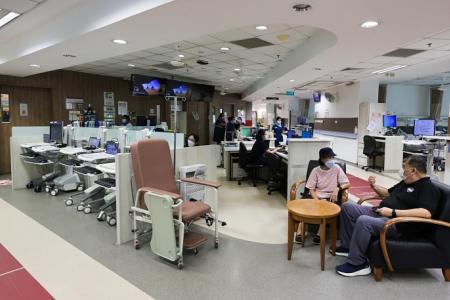TTSH’s new ward promotes faster discharge
One new ward at Tan Tock Seng Hospital (TTSH) is marching to a different beat.
Piloted since February, it encourages patients to get out of their beds to move about, and start drinking and eating earlier than the norm after surgery. It has shown that this approach enables patients to recover and get discharged more quickly.
Patients also end up paying less, generally, and their early discharge reduces the strain on the hospital system.
The Enhanced Recovery After Surgery (Eras) ward also looks different. On the floor, from one end to the other, is a decal designed to look like a running track in a sports stadium.
Near the nurses’ station is a communal space where two or three patients can sit to chat and read newspapers.
Next to the communal space is an activity corner where patients are encouraged to do light exercises.
During meal times, patients can gather to eat at a common dining table set up in each cubicle near their beds.
There are 36 beds in the new ward, and 135 patients have been admitted there since February after colorectal, bariatric or breast reconstruction surgery.
Patients from urology, head and neck operations, and other general surgery have also been admitted to the Eras ward to benefit from the standardised care by Eras-trained nurses and features of the ward.
About 97.5 per cent of patients have started drinking and eating, and about 98 per cent of them have been able to get out of bed, in the first 24 hours after surgery.
Early discharge means cost savings for patients in this new ward, where charges are the same as in a normal ward.
The Eras programme itself is not new. It was introduced in 2016 to patients who underwent colorectal surgery. Subsequently, patients who had major surgery such as bariatric, breast reconstruction, urology, head and neck operations were also placed in the Eras programme.
What changed in February was that the programme was given a dedicated ward, with facilities like the track to help the patients recover faster.
Many of such patients would previously have been sent to high-dependency wards, as they require closer monitoring. But beds in high-dependency wards are now freed up, lessening the strain on hospital capacities.
Compared with patients who stay in a typical ward, the average length of stay in the Eras ward for those who had colorectal or breast reconstruction surgery has been reduced by about 25 per cent.
The average length of stay in the Eras ward for patients who underwent bariatric surgery has been reduced by 50 per cent.
Priority for admission to the Eras ward has been given to those who had these three operations.
Dr How Kwang Yeong, lead of the Eras programme and senior consultant from the department of general surgery, said: “We choose to track and measure these three disciplines because they’ve got very established Eras guidelines.”
He said that the team hopes to spread the concept of the Eras ward to other surgical wards at TTSH, which is under the National Healthcare Group, but this is subject to the number of elective major operations the hospital performs.
“We’ve continued to inculcate the principles we have conducted in services so that every nurse in our surgical wards should understand what is Eras,” he added.
Dr How said that the team applied the guidelines from the Eras Society, a Europe-based non-profit group that seeks to develop care before, during and after surgery, and to improve patient recovery.
Over the past eight years, nurses have been trained to care for and help patients according to Eras guidelines, specifically to encourage patients to get out of their beds sooner, and to start consuming nutritional drinks and food instead of fasting.
Housewife Jasmine Chua, 69, who had colorectal surgery to remove a cancerous growth in her colon on Aug 30, was discharged on Sept 1.
She was able to get out of bed and walk about for short distances with the help of a nurse and a physiotherapist on the morning of Aug 31. On the same day, she drank apple juice for breakfast and had some clear soup for lunch.
Traditionally, patients who undergo colorectal surgery get out of the bed only after two to three days to move about and leave the hospital after eight days.
“I can now do some light household chores at home, such as mopping the floor,” Madam Chua said.
Madam Chua’s daughter, Ms Jayce Soh, 35, said: “Nurses are quite knowledgeable regarding the drugs, her recovery and nutrition information when I need to ask them. So I don’t necessarily have to wait for the doctor to drop by. They are quite clear on the conditions and what we can or cannot do. I think that was very helpful.”
Another patient, Mr Henry Soh, 64, who underwent a similar surgery on Feb 16, could sit up on the bed and started taking oral supplements one day after his surgery.
He could walk around the ward independently and interacted with other patients in the same ward on Feb 18. He was discharged by Feb 20, without needing medication, physiotherapy or chemotherapy.
“Dr How did a good job. He put me in the Eras ward. No need for chemotherapy or hormone therapy, no medications... I’m eating. My life is back on track. It’s a good testament to tell others to not give up hope,” Mr Soh said.
Get The New Paper on your phone with the free TNP app. Download from the Apple App Store or Google Play Store now


